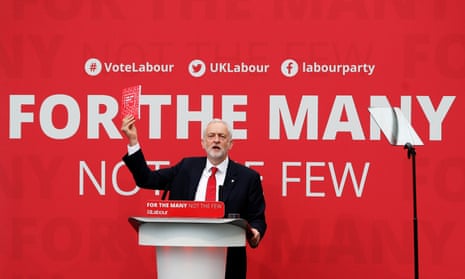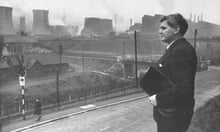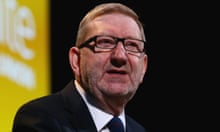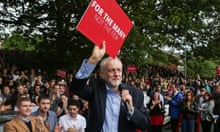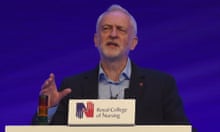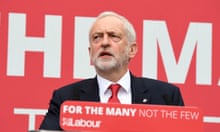Jeremy Corbyn’s biggest trade union backer has said he does not believe Labour will win the election but would have fought a successful campaign if it keeps 200 seats, although that would be the party’s worst result since 1935.
The intervention by Len McCluskey, the general secretary of Unite, overshadowed the launch of Labour’s election manifesto, which set out £50bn spending pledges and higher rates of tax for those earning over £80,000 and £123,000.
The union leader blamed a hostile media for the scale of the task of turning around the leader’s image in the minds of voters, but added that Corbyn would have succeeded even if he won slightly fewer seats than the 229 the party held in the last parliament.
“I believe that if Labour can hold on to 200 seats or so it will be a successful campaign,” McCluskey said in an interview with the Politico website. “It will mean that Theresa May will have had an election, will have increased her majority but not dramatically.”
Corbyn has suggested he may want to carry on as Labour leader if he loses the election, but support from his backers could fall away if there are heavy losses of MPs. The party won 209 seats in 1983, its worst postwar performance, and 154 in 1935.
Victory was unlikely, McCluskey added. He said that “Labour’s policies will make Britain a better and more equal society,” but added: “The scale of the task is immense. People like me are always optimistic … things can happen. But I don’t see Labour winning. I think it would be extraordinary.”
Labour’s manifesto launch focused on the party’s costings for its policies – because many of its other headlines such as rail nationalisation had been leaked to the media last week – and proposed new income tax bands.
Under Labour, those earning more than that amount would pay the 45p rate, with a new higher band of 50p starting at £123,000. Around 800,000 people would be brought into the 45p tax band, while a further 500,000 earn enough to qualify for the proposed 50p level, bringing in up to £6.4bn a year.
Flanked by his shadow cabinet, Corbyn also pledged to nationalise the water industry as well as confirming plans to bring the railways, Royal Mail, and parts of the energy market into public ownership, to cheers from supporters at an event in Bradford.
Labour said taking parts of the energy system and water industry into public ownership would save customers £220 a year on their bills.
The party said it would undertake nationalisation by exchanging government bonds for shares in the relevant companies, and make savings for customers by not paying dividends and having lower borrowing costs.
A costings document published alongside the manifesto said the party could raise £48.6bn in current expenditure through tax increases, with almost £20bn from reversing corporation tax cuts made.
Corbyn told the crowd that he was “ruling out rises on VAT and national insurance and on income tax for all but the richest 5% of high earners”. However, the party did not provide costings for any of the proposed nationalisations, arguing they were capital expenditures and so separately accounted for by borrowing. Corbyn added that in rail and water the moves were likely to be financially “neutral”.
During the launch, Corbyn also suggested that Labour would reverse the Conservative party’s benefit freeze, triggering speculation about the costs of such a move.
“Yes, increasing benefits is important and clearly we are not going to freeze benefits, that is very clear,” he said. “We are also looking at the perverse effects of the benefit cap on people and their housing accommodation, particularly in London and the centre of our big cities.”
The party issued a clarification saying they would end the Conservative government’s four-year freeze on working age benefits, by injecting £10bn into the benefits system over five years. “As Jeremy Corbyn made clear today, that will mean an end to the freeze. The form that restructuring will take will be subject to review,” a party spokesman said.
The manifesto itself outlined a figure of £2bn to be ploughed back into universal credit, with a further £2bn used to reverse unpopular cuts to certain disability benefits, the bedroom tax and payments for bereaved parents.
Sources said higher pay under Labour would also go some way to compensating recipients of in-work benefits. Other money-raising ideas include an excessive pay levy for companies, including premier league clubs, that pay “fat cat” salaries, a tax on City deals and VAT on private school fees.
Carl Emmerson, deputy director of the IFS, told the Guardian that the policies represented “a very big tax rise”. “They will almost certainly bring in tens of billions of pounds but quite possibly not the full amount that Labour expects.”
How will the average person's tax burden change under a Labour government?
Labour has pledged not to raise the tax burden of those on low and middle incomes. The standard income tax rate will remain unchanged as will VAT. That means someone on the average wage of £26,500 will pay the same. Labour plans to apply the 45p rate to the 500,000 who earn between £80,000 and £100,000. The Institute for Fiscal Studies said this group would pay on average £400 more a year. The 300,000 earning between £100,000 and £123,000 would lose up to £2,725 while the 50,000 earning over £500,000 would all lose at least £22,900 a year. Philip Inman
He said that the impact of the change in the rates for income tax was very “uncertain” because it was not clear how people would respond and whether there would be a spike in avoidance. Labour have reduced the total likely to be raised through tax by £3.9bn to account for “additional behavioural change and uncertainty” but Emmerson pointed out that the figure covered two huge shifts in corporation and income tax.
He also highlighted the Labour priorities arguing that they had “offered big increases for schools, infrastructure, childcare and tuition fees but much less for the NHS or reversing benefit cuts”.
High-earning graduates would benefit most from the tuition fees policy, he said, while a bigger move on benefits would have targeted the working age poor.
As well as a major commitment on tuition fees, Labour has outlined plans to inject £6.3bn into schools, £5.3bn to extend the 30-hour offer on childcare to all two-year-olds, £5bn a year on the NHS, £4bn to close the public sector pay gap, the welfare changes and £2bn a year on social care.
Some of the other key policies include:
- Ending free movement after Brexit, while not “scapegoating migrants nor blaming them for economic failure”.
- Rejecting leaving the EU with no deal because of the damage to the economy and trade.
- Creating a “national education service” that would extend childcare for all two-year-olds, reverse budget cuts to schools, boost further education and abolish tuition fees.
- A 20-point plan on workers’ rights that would provide trade unions with more power, ban zero-hours contracts, put in place a 20:1 pay ratio in companies bidding for public sector contracts, and introduce an “excessive pay levy” for private companies wanting to pay large salaries.
- Introducing rent controls and building 100,000 new council homes.
The documents also referred to the possibility of reviewing the way that council tax is charged in order to make the system fairer.
Speaking at Bradford University, Corbyn said he was following in the footsteps of its former chancellor, former Labour prime minister Harold Wilson, who did “so much to expand university education and make it accessible to all”.
But he said it was wrong for people to characterise his agenda as a return to Labour politics of a previous generation. “Talking about the 1970s – I simply say that the other major party contesting this election is really forward looking – they are going to bring back foxhunting and grammar schools,” he said.
A journalist from Channel 5 was booed by the audience of activists for asking Corbyn whether he thought immigration should be reduced. The Labour leader asked his supporters to be respectful of the media and gave a staunch defence of the contribution made by immigrants.
Asked why he was personally unpopular despite his policies polling well, Corbyn claimed that “being strong” was not necessarily about “shouting or dictating”.“I am very, very proud to lead this party. I was elected by a very large number of members and supporters ... I see leadership as not dictating – but leadership is about listening, understanding the stress, pressures and tensions in [people’s] lives and making sure our party reflects the reality in people’s lives.”
The Conservatives claimed Labour’s plans were far from fully costed.
Philip Hammond, the chancellor, said:“There is a £58bn black hole in Jeremy Corbyn’s manifesto – and it will be paid for by every single family in the country with higher taxes and more debt. Jeremy Corbyn’s numbers simply don’t add up, and he can’t be trusted to run the economy or negotiate the right deal for Britain.”
